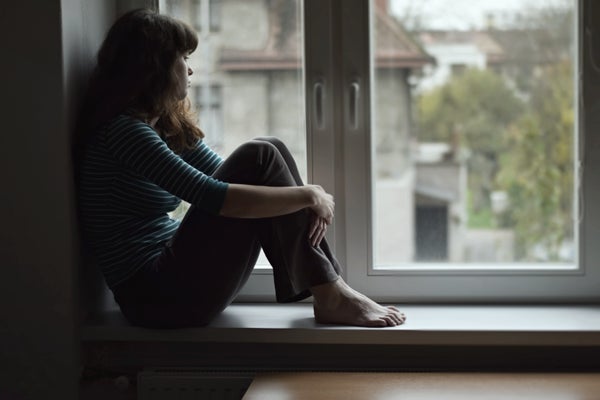There’s a reason the term “physical distancing” hasn’t been used much during the coronavirus pandemic: Though it’s a more accurate description of what public health experts are trying to achieve than “social distancing,” it fails to capture the loss that many of us feel as a direct result of being separated from other people.
Young Americans might be the loneliest of all. As a cognitive scientist and college president, I’m worried about that.
Loneliness has been a growing problem for decades—with some estimating that 61 percent of adults in the United States feel it—and it’s only been made worse by the COVID-19 lockdown. Over the last four months, the requirement that we sequester ourselves whenever possible, venturing outside our homes only for essentials and maintaining a six-foot minimum distance from fellow shoppers or exercisers, has been frustrating—even painful. While keeping to ourselves helps prevent coronavirus’ spread, humans are social creatures and prolonged isolation takes a toll on our mental health.
On supporting science journalism
If you're enjoying this article, consider supporting our award-winning journalism by subscribing. By purchasing a subscription you are helping to ensure the future of impactful stories about the discoveries and ideas shaping our world today.
The BBC Loneliness Experiment, a large-scale global study, recently published its much-anticipated results, revealing that self-reported loneliness is highest among young people, men and those in "individualistic" societies.
And this loneliness can be seen in the brain. One study found, for example, that when mice, a social creature like us, are forced to live in cages by themselves, it changes their brains’ basic architecture and causes nerve cells to shrink. A more recent study of what social distancing during the pandemic has been doing to humans identified that the neural underpinnings associated with isolation are similar to those of physical hunger: to say you’re “starving for contact” isn’t far from the reality of what’s happening in your body in neurobiological terms.
Loneliness—much like hunger or thirst—is a signal that we’re lacking something. Prolonged social isolation can even contribute to heart disease, stroke or premature death.
Clearly, we humans need at least a few deep, meaningful relationships to maintain good mental health and keep loneliness at bay. But how many? And what are the steps to get us there?
Back in the 1990s, British anthropologist Robin Dunbar, upon discovering a correlation between primates’ brain size and the social groups they formed, concluded that humans have the brainpower to maintain about five close relationships.
Most of us fall woefully short of that number, unfortunately. The average American’s number of close confidants (individuals with whom we can discuss important matters) has been shrinking. Adults in the U.S. had three confidants in 1985 compared to just two in 2004. And approximately one in four Americans reported having no close confidants in 2004—an almost threefold increase from 1985.
More recent data show that one in five millennials have no friends at all. And a survey released in 2020 found that 71 percent of millennials and almost 79 percent of Gen Z respondents report feeling lonely—a significantly greater proportion than other generations.
Deep friendships are becoming rare, especially among the young.
But we can work on cultivating and maintaining relationships. Here are some brief steps we can take on this front:
Keep an open mind. It’s easy to automatically rule out someone as a friend because of an age gap, divergent political perspective or different taste in books, movies or music. Stop. Give everyone a chance. Even one common interest can serve as an avenue into another person’s inner world and establish the foundation for a closer connection.
Be the friend you’d like to have. Say yes to invitations, be reliable, respond to texts, e-mails and voicemail messages in a timely way. Consider volunteering your time for worthy causes, which will position you to help others who may also struggle with loneliness. Provide instrumental and emotional support and give your friends your full attention. Celebrate their accomplishments. Remember their birthdays and other important events. Listen to their troubles and provide a shoulder to cry on, when needed.
Make yourself vulnerable and be the first to show trust. Share something personal about yourself and be courageous enough to extend the first invitation to an event or social outing (know that you might get turned down, just like when pursuing a romantic relationship).
Be compassionate with yourself. Expect to make a few mistakes when trying to establish new friendships. No matter how hard you try, you’ll eventually say or do the wrong thing. Keeping that in mind can help you to stop being your own worst critic. Try to be as understanding of your own missteps as you are of others’ minor blunders. If appropriate, apologize. Then, move on. A little self-compassion will make the whole process easier, especially when a budding friendship fizzles (you won’t be everyone’s cup of tea, and that’s okay).
Connections with other people help us thrive as human beings and face the slings and arrows of daily life. No one needs to feel completely isolated—even when we are physically distancing. There are steps we can take to form (or cultivate) close bonds, whether in person or virtually.
